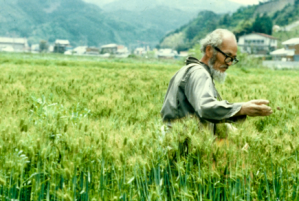Tending to his fields in Iyo, Ehime on the island of Shikoku, Japan. The son of a landowner and mayor who grew rice and mandarin orange orchards, Fukuoka grew up in a small village the eldest of his siblings and went to school for agriculture. Afterwards he worked in the Yokohama customs office inspecting plants, studying plant diseases, fungi and pests found on imported crops. During this time he enjoyed the life of the city fallin in and out of love many times and through exhaustion fell ill by acute pneumonia. Subjected to cold winter air as treatment through solitude and loneliness he contemplated death and the fear of death. When he finally recovered he continued to ponder on the meaning of life, one night as he strolled through a path through Yokohama he thought about if he were to die now that he did not have even a few true friends and his mother would be sad but the reality was a state of nothingness… He fell asleep under an elm tree and woke the next morning to a shriek from a heron..as the sun broke through the morning mist..and birds chirped he realized, “in this world there is nothing at all”… he suddenly understood that, “all the concepts to which he had been clinging were empty fabrications. All his agonies disappeared like dreams and illusions, something one might call ‘true nature’ stood revealed.”
He quit his job and traveled through the country interacting with others and spreading the idea of all that is will eventually fade into nothing, people who talked to him though he was eccentric, Fukuoka-San eventually moved back to his village where he was from to start the life of a farmer…
But the initial technique of doing nothing with the mandarin orange orchards his father had maintained and pruned ended with their death as they had been pruned and would grow in reaction to the prunings and manipulation and when left alone grew into itself, insects and disease eventually killing off the trees… the conclusion being once trees have been cultivated they cannot adapt to human neglect.
After getting married and starting work at the Kochi Prefecture agriculture station as chief of the insect and disease control section .
Fukuoka also advised farmers about chemical farming and wrote a “farming tips” column for a local newspaper. On his own, however, he conducted comparative studies. He compared yields from intensively cultivated crops enhanced with compost and chemical fertilizers and pesticides those achieved from crops grown without chemical additives. His conclusion was that the use of fertilizers and pesticides was not really necessary. Although these additives resulted in a marginally higher yield, the value of the yield did not exceed the cost of achieving. Thus, at Kochi Fukuoka established to his satisfaction the superiority of natural farming over farming with chemical aids. Building upon his earlier revelation that “doing nothing was best,” these studies laid the scientific basis for his lifework.
(there is more about Masanobu Fukuokas life on the website listed)



You post interesting articles here. Your website deserves much more traffic.
It can go viral if you give it initial boost,
i know useful service that can help you, simply type in google: svetsern traffic tips